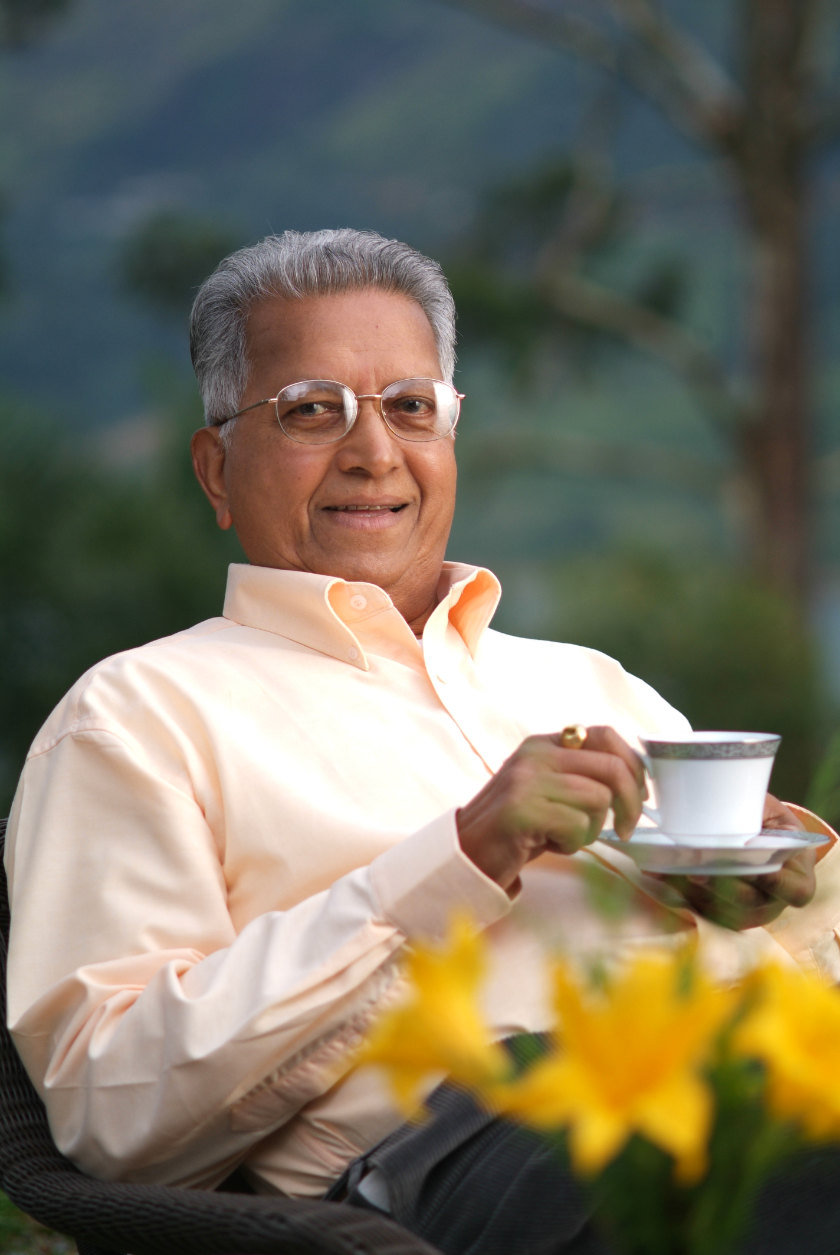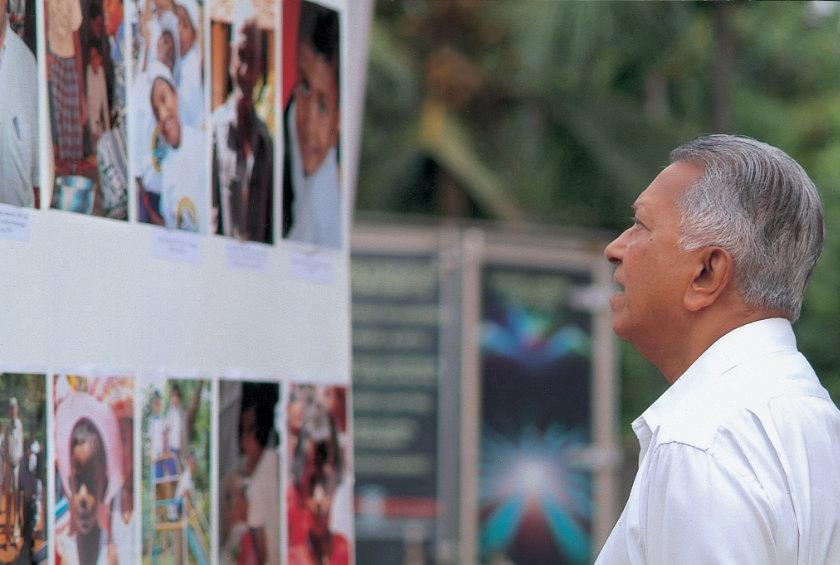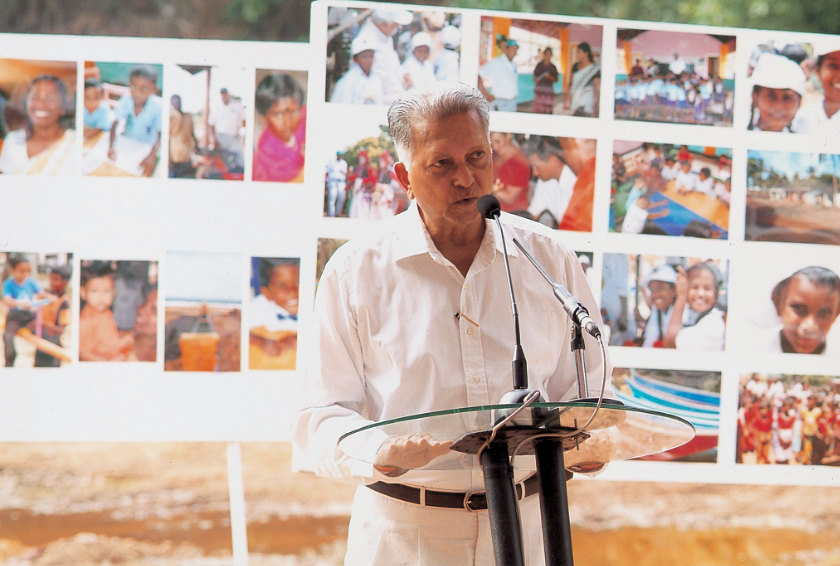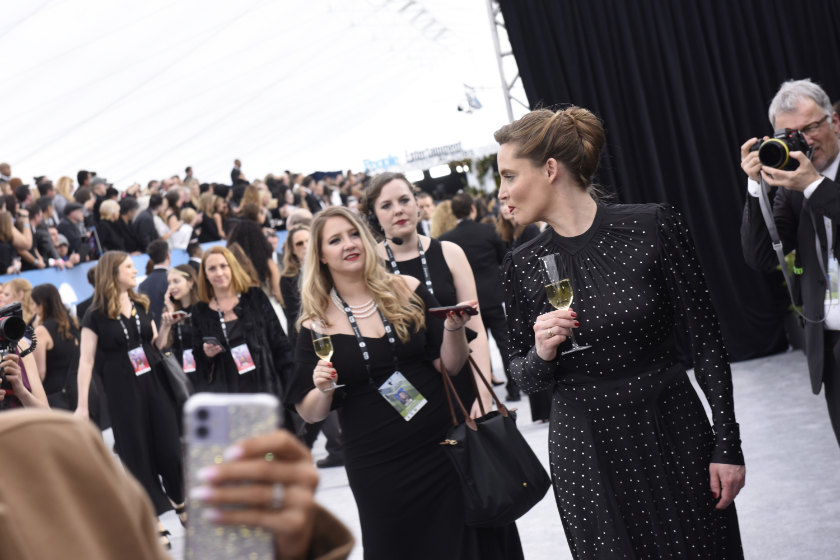
Merrill Fernando photographed with his grandchildren in February 2006
LIVING Merrill J. Fernando is well known as the founder and public face of Sri Lanka’s Dilmah Tea, a Brands with a Conscience Award winner. Jack Yan spoke with him on social responsibility, family and his company’s part in the relief efforts for the Boxing Day tsunami
Originally published in issue 20 of Lucire


This story has been two years in the making. I first interviewed Merrill J. Fernando, the founder of Dilmah Teas, on his 2004 visit to New Zealand. (He returned at the end of September 2006.) He had come to New Zealand to help with the promotion of his company, along with his son Dilhan, and I had the pleasure of lunching with them. The meeting so impressed me, as did subsequent research into Dilmah, that I nominated it for a Medinge Brands with a Conscience Award for 2005.
Fellow committee members at Medinge, a branding think-tank in Sweden, agreed with the nomination, and the company won, among others that had garnered acclaim for their work in corporate social responsibility. With Dilmah this goes further, with two facts from that first meeting resting in my mind: first, Fernando does not plan to leave an inheritance to his sons; secondly, his MJF Foundation has been behind the building of schools, churches and hospitals in its native Sri Lanka.
The west has much to learn from Fernando and his company, beyond the personality that appears on television urging us to sample Dilmah teas with the tagline, ‘Do try it.’
We planned to run his story in early 2005, but for one major event: the Boxing Day tsunami of 2004. There was no way we could, in good conscience, email Fernando for additional answers, and as time wore on, various events saw the story put back.
Initially, I had concerns about Fernando’s ideas about inheritance: ‘In Asia, one often leaves [a legacy] to children and it is squandered,’ he told me. ‘My two sons get nothing, so they do not squander.’
After seeing high-profile squabbles over fortunes in the United States, I became convinced that Fernando is on to something. But his method is grounded not on spirituality, but on practicality: ‘There were rich people at school, who fell by the wayside. [Today,] they are [in] the gutter.
‘Malik and Dilhan started as trainees and worked their way up through production, procurement, tea and marketing. They eventually found their niches, Dilhan in marketing and Malik in operations and running our ancillary businesses.
‘My instructions to my staff have been that they are my sons after hours and in office they remain employees, like everyone else. I think this has helped them to a great extent because they have earned their positions rather than being placed there without demonstrated merit.’
But what Fernando told me certainly sounds like the path of a spiritually aware man. His latest advertising campaign, in 2006, talks of ethical tea manufacture, for instance, and my examination is that his programme is fairer than Fair Trade. ‘There are people who worked with me and helped me. So people down the line must share what we have and what they have helped to build. The excess goes to the community.
‘The more you give, the more you get back. We come to this world with nothing. What you have, you must give others while you are still alive,’ he said.
This is particularly important in Asia, added his son, Dilhan. There is no social welfare in Sri Lanka, he explained, hence the family, through its foundation, created a hospital for a catchment area of 5,000–6,000 people, helping to reduce infant mortality. Schools have benefited from computing courses that they fund. ‘We can change the minds and lives of thousands.’
Merrill Fernando continued, ‘Workers receive assistance in their day-to-day existence with subsidized groceries, assistance with housing, interest-free loans as well as the usual requirements of health, etc. Additionally, we try to be flexible in understanding their needs and addressing them at all levels. On the tea estates, the work of the MJF Foundation brings tea pluckers the benefits of free medicines, free hospital facilities, educational scholarships, nutritional programmes and assistance for elderly and retired workers, child-care facilities in crèches which have been upgraded to model crèche standards by the Foundation, amongst others.’
I emailed Dilhan after the Boxing Day tsunami and learned that the MJF Foundation was preparing to donate nets to fishermen who were affected by the disaster.
Merrill Fernando elaborated, ‘Our response to the enormous suffering caused by the tsunami took two forms: short-term emergency assistance (which included tending to the injured, providing food, medicine, drinking water, etc.) and long-term reconstruction (rebuilding homes, schools, hospitals, providing psychological support for the affected and ultimately rebuilding the socioeconomic fabric of the coastal communities).’ He believes the death toll was closer to 75,000, not the 40,000 that had been initially estimated.
‘Among the fisher communities which bore the brunt of the tsunami, the MJF Foundation has, like several other charities, replaced boats, nets, provided engines, community centres and storage facilities. What is a little different about our activity in these areas is that we have tried to ensure that the material assistance we provide is part of a comprehensive and sustainable programme of assistance rather than simply being a donation of goods.’
Fernando stresses that some NGOs’ donations of boats have led to destructive fishing—something the Foundation is trying to avoid.
‘The programme also envisages long-term involvement with the beneficiaries to follow the “Dilmah model” in giving the fishermen for the first time, direct access to their market.’ Fernando stresses the long term, and that the disaster continues to have effects in Sri Lanka, even if it is not in the news regularly any more.
Former president Chandrika Kumaratunge has given more awards to the company in the meantime, ‘for our efforts at easing the suffering of tsunami-affected communities and for the social and environmental conscience that our companies have demonstrated,’ he said. ‘Social justice and conventional aspects of commercial success are compatible.’
It is a message that western companies, which I am more convinced are falling behind on this aspect, would do well to learn. Profit is important, but the profits that can come from corporate social responsibility can far outweigh any conventional approach. Twenty-first-century consumers demand it. •
This story was originally published in print in October 2006. Jack Yan interviewed Merrill Fernando again in 2015 for the book Brands with a Conscience. The first chapter may be downloaded here.
Jack Yan is founder and publisher of Lucire.


Related articles hand-picked by our editors

It’s real life: conquering body image issues
Alli Spotts-De Lazzer’s MeaningFull is not only founded on a qualified therapist’s knowledge, but first-hand accounts of people who have dealt with dieting, weight and body image issues, and come out the other side having beaten them
Photographed by Drop the Label Movement

Rachel Hunter: an earth angel spreads her wings
After a multi-decade flight riding high as an international supermodel, New Zealand-born and bred Rachel Hunter came back to earth to embark on a journey of self-discovery, personal wellness and inner peace. She shares her discoveries about revitalization, reinvention and renewal with women everywhere through media, meditation, nutrition and yoga, reports Jody Miller

Good house keeping
Vitalie Taittinger pours into her family’s centuries-old legacy, while paying tribute to the contributions actors are making to Hollywood’s history. Elyse Glickman speaks with her
Photographed by Vivien Killilea